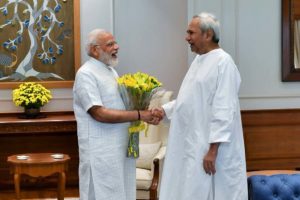PARLIAMENTARY DILEMMA
By Dr. K.K.PAUL
The role of the Speaker has come under much criticism in recent times. There’s a need to bring changes to the anti-defection law besides strengthening the office
Even as controversies surrounding the office of the Speaker and the anti-defection law have again come into sharp focus, the minority judgment in Kihoto Hollohan vs Zachillhu And Others (1992) appears to have become the central point of debate. The fundamental issue, which quite a few of the Speakers have not been able to address, is not all that complex. It has so become in view of an inherent conflict of interest. Since the Speakers, after assumption of the high office, do not sever their links with their parent parties, a conflict of interest manifests in different forms, including bias, in several cases under the anti-defection law.
The minority view in this landmark case of 1992 was that assigning powers of adjudication to the Speaker was against the basic structure doctrine and the separation of powers between the judiciary, legislature and the executive. Further, it was contemplated that adjudication of such a dispute should be done by an independent authority outside the House, namely President/Governor, and in accordance with the opinion of the Election Commission of India (ECI) — all of whom are high Constitutional functionaries.
The matter pertaining to the order of former Speaker of the Karnataka Legislative Assembly, KR Ramesh Kumar, is yet to be decided by the Supreme Court. In accordance with his orders, disqualified MLAs have been barred from contesting the elections till the end of the current legislative tenure, ie, till 2023. Although the law does not specify any limits, the Speaker can pronounce his judgment on disqualification in view of defections, based on his discretion and fairness.
But such a duration of disqualification, as in the instant case, has been unprecedented. It will be worth recalling here that in 2011, when 13 MLAs of the Bharatiya Janata Party (BJP) were disqualified by the Speaker on the ground that they had retracted their support from the Yeddurappa Government, the Supreme Court held that, “Not only did the Speaker’s action amount to denial of the principles of natural justice but also revealed a partisan trait in the Speaker’s approach in disposing of the disqualification application filled by Respondent No 1. If the Speaker wished to rely on the statements of a third party, which were adverse to the appellants’ interests, it was obligatory on his part to have given the appellant an opportunity of questioning the deponent as the veracity of the statements made in the affidavit. This conduct on the part of the Speaker is also indicative of the ‘hot haste’ with which the Speaker disposed of the disqualification petition as complained by the appellants.”
The Speakers of the Lok Sabha as well as those of the State legislatures are elected on the tickets and symbols of a political party. Unlike the House of Commons, from where our parliamentary system has drawn inspiration, our Speakers continue to retain their links with their respective parties. While the routine conduct of the proceedings in the House does not pose any serious challenge, the situation gets complicated when the Speaker assumes the role of an adjudicator under the anti-defection law as s/he is prone to decide cases as per party affiliations.
So much so that in the instant case, the new Speaker of Karnataka, who is from a different political party, has offered to review the orders of the previous Speaker, which is against the letter and spirit of an apex court judgment, according to which, a Speaker’s order is final and cannot be reviewed, except by a judicial authority.
In some previous cases from Tamil Nadu, Telangana, Goa, Andhra Pradesh and Uttar Pradesh, the role of the Speaker has been quite debatable. It is quite obvious that some of them have not been able to live up to the pious thoughts besides moral as well as ethical principles, which formed the basis of the majority judgment in Kihoto Hollohan.
It went on to state: “Accordingly, we hold that the vesting of adjudicatory functions in the Speakers/Chairmen would not by itself vitiate the provision on the ground of likelihood of political bias is unsound and is rejected. The Speakers/Chairmen hold a pivotal position in the scheme of parliamentary democracy and guardians of the rights and privileges of the House. They are expected to and do take far-reaching decisions in the functioning of parliamentary democracy.”
It is a different matter though that the author of these views, former Chief Justice of India, MN Venkatachaliah, revised his stand while chairing the commission to review the working of the Constitution and supported an independent agency like the ECI to decide on the proceedings under the anti-defection law. This was, however, not accepted.
A case in point is the reluctance of the Speakers as well as Deputy Speakers to avail of the exemption provided for in Section 5 of the anti-defection law, which is quite embarrassing as it clearly indicates that they wish to retain their links to their parent political parties.
As early as 1951, the conference of presiding officers of legislative bodies in India had recommended that a convention should be established that the constituency of the Speaker should not be contested and he should be returned unopposed.
Further, he should not take part in party politics. Such was indeed the situation before Independence as the presiding officers from Vithalbhai Patel onwards dissociated themselves from their parties.
Now, in order to comprehensively address this problem, we do not necessarily have to resort to the use of minority judgment. In fact, besides the amendments to the anti-defection law, we also need to consider strengthening the office of the Speaker and ensuring his neutrality by following a convention where in the subsequent elections to the Parliament, he is returned unopposed.
(The writer is a former Governor and a Senior advisor at the Pranab Mukherjee Foundation)






